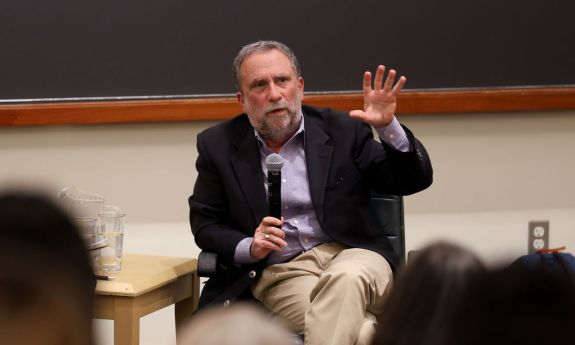Potential Outcomes from the Israel-Hamas War
Robert Satloff, Middle East expert and Duke alumnus, discussed the future he envisions for the Palestinian people

The second possibility with Hamas removed and a hostage ceasefire agreement in place, he said, is “a trilateral set of agreements that bring about Saudi (Arabia)-Israel peace and normalization, and a Saudi-American mutual defense treaty … a three-way deal that will be transformative. And it may very well be the exit ramp off the war altogether. It is something the Saudis are keen on doing.”
Israel would likely need to elect new leadership for these developments to occur, Satloff said, something he thinks could happen this year.
“My own view is this is a quintessential Just War, in which there’s an enormous, tragic aspect, which is the tragedy of the civilian casualties,” Satloff said, also noting Hamas’ “perverse” use of women and children as human shields.
I'm a firm believer in free speech, that most speech will defeat objectionable speech, eventually. But ... it has to be married with civil discourse.
Robert Satloff
Monday’s talk, “Out of Crisis, Opportunity? War and Peace in Post-October 7 Middle East,” was part of the Provost’s Initiative on the Middle East. Sanford School of Public Policy professor Bruce Jentleson moderated the discussion.
Satloff said he’s impressed by how well Duke has navigated tensions on campus since the Oct. 7 Hamas attack on Israel.

“And I'm glad that you have this initiative here on civil discourse, which is so important,” he said. “You will be surprised how many universities don’t lay down the fundamental principle of civil discourse. I’m a firm believer in free speech, that most speech will defeat objectionable speech, eventually. But … it has to be married with civil discourse.”
Jentleson added: “A skillset for all of us … is if we can agree to disagree and still pass a cup of tea to each other in a very Middle Eastern way, that’s kind of what we strive for.”
Satloff encouraged people to learn the history of the Middle East, noting the conflicts didn’t begin a few years ago or even when Israel became a nation again in 1948.
“Invest the time and find real sources, real stories, real factual basis for having the discussion,” he said.
Satloff, who traced his focus on the Middle East to his time studying Arabic at Duke more than four decades ago, advised students that it’s “better to be a big fish in a little pond than a little fish in a big pond. Which is, learn something, anything, but be the best at it and be the world’s expert at something if you can. From that you can always go bigger.”